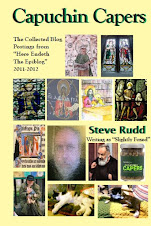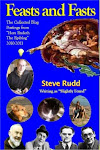It has been a busy week in the Holme Valley,
and, apart from today, which is windy, cold, blustery and showery, with
occasional showers of spiky rain, the rest of the week has
been fine, warm, and sunny. Yes, warm - that thing we’d all forgotten. I can
finally forsake my winter duvet in favour of a single layer of down sleeping
bag. Spring, when, as e. e. cummings
once said, the world is mud-luscious and puddle-wonderful. Spring, “whan spray
beginneth to, er, spring.” We still only have one daffodil by the pond, though,
boldly trumpeting its golden message of defiance to the cold dark days when it
was just a bulb in the mould.
With spring, of course, a young man’s fancy turns to herbs,
and an old saggybaggy pusscat’s fancy also turns to spending more time in the
garden. Actually Matilda is not that old. She was allegedly 8 or 9 when we got
her, which makes her either 11 or 12 this year – 55 or 60 in human terms. Most cats would be settling down and spending
more time with their bowl, their milk and their catnip mice three at this stage
of life, but Matilda sparked a major alert by going missing for 15 hours
overnight on Thursday. With the warmer
weather, we’ve been leaving the cat flap door open all the time (we can’t do it
in winter because the draught from it aims straight for my bed and I tend to
wake up with ice crystals in my beard) so she has been coming and going more or
less as she pleases.
I think on reflection what she must have done is that she
went out during the very warm afternoon, and found herself a nice place to curl
up and nest in the garden, although we couldn’t actually see her. Because Thursday was such a warm day, it
didn’t cool off dramatically after sunset like it usually does, so I am
guessing she just slept on regardless. Some days, like Debbie, she could sleep
for England. Anyway, bedtime arrived and there was still
no sign of the missing cat, so I decided that I would stay up and make sure she
was OK. This was the start of some four
hours of trundling round from door to door, trying to call her name loudly
enough for her to hear but not so loud as to wake the neighbours, all to no
avail. At 2.30AM I even went out into
the driveway for a stooge around and unlocked the side door of the camper to
make sure she hadn’t managed to get herself shut in there by accident. (Nigel
was a great one for stowing away while we were preparing to go off on a trip,
and we lived in dread of suddenly hearing a pert “meeeow” from the back seat
when we were half way up the M6, but it never actually happened).
Anyway, by 4.30AM I was sitting in my wheelchair, dozing by
the stove, and trying to keep awake until first light, when I would resume the
search. I was already making mental lists of all the things you have to do when
you lose a cat, like printing out posters and sticking them on the local
tellywag poles, and wondering if it was too late to cancel the cat food off the
Sainsburys order, when she sauntered in, completely unconcerned, polished off
two sachets of Felix and some dry food on the side, curled up on her cushion,
and went fast asleep. I went and shut the cat door, with a resounding clang
that probably woke the whole house, but by then I was past caring. God alone
knows where she had been for all that time, probably murdering some hapless
rodent, or counting the stars in Orion’s penis like Stewie Griffin, or
possibly, since her eyes were wide as saucers when she first came back, she had
been looking into Chapman’s Homer, since she stared about her with a wild
surmise. Who knows. Anyway, that night I had four hours sleep and both of us
lost one of our nine lives.
This week, I also became 60 in human terms. In cat and dog
years I’m already dead, of course. The occasion passed extremely pleasantly –
the day itself was relatively painless – like old Shakespoke once said, it’s
the bit leading up to it which tends to be the gnat in the germoline. I’m
paraphrasing, of course, but by the time you actually get to 60, and realise
the inevitability of it, there’s not much you can do apart from to say,
metaphorically, to life, “pull my vest down when you’ve finished.” For once, I spent the day doing things I
wanted to do, rather than the things I had to. The fact that it was Easter
Monday helped, and nobody was expecting me to be compost mantis anyway. So I did some painting, and I did some
pottering around in what passes for my garden, and in the evening, I looked a
spinach and chickpea pie and we had that with fat chips and beans, washed down,
rather incongruously, with Chateauneuf du Pape, which was one of my birthday
presents. I worked out that Debbie would
have had to have worked an hour and a half to earn the money to pay for it, but
if you can’t push the boat out (or push the Pope out, more like) on your 60th,
then when can you?
The week progressed in like vein, actually. I did have to do
lots and lots of tedious work, catching up on stuff I had wilfully neglected
over Easter, but at the same time, I found myself able to receive and plant out
into planters, two large cartons of herbs.
This was despite the fact that the courier which delivered them, UK
Mail, is to fragile items what Jimmy Savile was to child-minding, and one of
the boxes, when I got it, was a complete bugger’s muddle of soil, leaves, and
empty pots. Anyway, for better or for worse, they are all out there now,
protected for the most part by cloches and some panes of glass which I saved a
couple of years ago when Owen dismantled our old outside door.
I posted a picture of them on Facebook and a lively
discussion ensued about the various herbs and their properties, especially
English Mace, which is something different in America, as I learned. In America, Mace
is the outer skin of a nutmeg. It’s also what the police use on black people
for a few nights, whenever one of them gets shot. Just when I thought the extended 60th
celebrations were finally over, at the end of the week, a box arrived
containing some wonderful vegan chorizo, sent by one of the readers of this
blog, an unexpected but very kind and generous gesture. The box it arrived in
was actually sealed with some sticky tape bearing a running advert for vegan
dog treats, and at first Debbie accused me of spoiling Misty and ordering
expensive stuff unnecessarily, since the house is already awash with dog-treats.
When it turned out that the contents were human treats, and I was not
responsible for them, the vindication made them all the tastier.
I haven’t been paying much attention to the outside world
this week, partly because I’m deliberately ignoring the election coverage and
partly because I’m sixty, you know.
However, even I couldn’t miss the Junta’s ham fisted attempt to demonise Ed
Miliband as someone who might endanger national security by kow-towing to
demands from the SNP to remove Trident in return for their support on an issue
by issue basis if Labour forms a minority government after May 7th. From the party that produced the “demon eyes”
poster of Tony Blair, I suppose in one sense they’re only following previous
form, but even so, the only shots now left in their locker are the Blood Libel,
The Zinoviev Letter, and the unfounded assertion that after the election,
Miliband will attempt to conjure up the ghost of Aleister Crowley and sacrifice
a goat on Chidham Common.
When you start to tease it apart, you realise that the claim
is, of course, what Marcus Aurelius, were he here right now, would label as
“totum taurem excretum”. For a start, it would require a specific set of
circumstances that in any case might not occur, and Miliband has already ruled
out a coalition with the SNP, but the Blight Brigade needs to be very careful,
in any case, when it starts bandying assertions about imperilling national
security. Cameron was the fatheaded twerp who allowed himself to be painted
into a corner by Alex Salmond and put Trident in danger by allowing a
referendum that almost broke the UK apart, and it was the Junta themselves who,
because of their bone-headed recalcitrance, have left the UK without an
aircraft carrier for a decade. True,
they did manage to get a British aircraft carrier into the Med during the
ill-judged and useless, costly foreign policy intervention in Libya – it was
our last one, on its way to the breakers’ yard. So, Mr Cameron, in a world
where maritime power is at least as important to us now as it was in Kipling’s
day, a world where if anyone hinders the coming of the “big steamers”, we’ll
starve, when it comes to endangering national security, it’s a case of “Taxi
for Mr Kettle.”
Talking of Kipling, and poetry about ships, reminds me of
the only other significant story I noted during the week: apparently there is
now only one right answer when it comes to poetry. Education secretary Nicky Morgan was the
subject of a coruscating demolition of her proposed new mini-syllabus in an
open letter written by children’s poet and performer Michael Rosen. This
extract from Rosen’s article goes to the nub of the question:
Now, though, there’s
an official view of what poetry is for: “Standards and Testing Agency, Key
stage 1 English reading, sample questions, marks schemes and commentary for
2016 assessment”. Here we find Where Go the Boats? by Robert Louis Stevenson,
followed by eight questions, their correct answers – that’s to say, the only
answers that are allowed, and a commentary to explain what’s being tested. This
will lay down the activities of thousands of teachers, children and parents
between now and May 2016. Thousands of hours of school – and homework – time
will be focused on these correct answers. It’s no use you, or any Ofsted report,
telling us that it’s only bad teachers who teach to the test. Because of your
system of enforced conversion to academy status on the basis of schools not
scoring high enough on tests, schools will teach to the test. Inevitably, this
test will enforce what reading poetry is about and what it’s for and that
doesn’t coincide very much with what poets and people interested in poetry have
to say about it.
Speaking as someone who once got chucked out of a seminar on Gawain and the Green Knight at University
for daring to suggest that there might possibly be a specifically pagan
interpretation of a poem about a scary green giant who gets his head cut off at
the turn of the year and then comes magically back to life again, this
resonated with me. When Christopher Ricks was Oxford Professor of Poetry, he
caused a huge controversy with an interpretation of Milton’s lines:
His state is kingly,
At his bidding
thousands speed
which suggested that the poet was writing about his erect
penis. Yes, OK, it was Christopher
Ricks, but even so, these days he’d be banged up by Ofsted before you could say
“Seven Types of Ambiguity”. The whole
point of poetry is the interpretation thereof.
If you reduce it to black and white, then any discussion of, for
instance, whether Tennyson is being critical at the same time as admiring the
bravery of the Light Brigade when he writes that “someone had blundered” is
void. The correct answer is six hundred.
Poetry cannot be quantified and measured, and there are no
right answers. A good poem has as many
right answers as it has readers, and it yields up its meaning gradually, over
many readings. The skill of analysis and interpretation is what it’s all about,
but then the Junta doesn’t want the education system to produce people who can
analyse and interpret text, because they might find themselves thus analysed,
and found wanting, interpreted as
exponents of the Gradgrind system, in agreement with Lady Bracknell when she
says:
I do not approve of
anything that tampers with natural ignorance. Ignorance is like a very delicate
exotic fruit. Touch it and the bloom is gone. The whole theory of modern
education is radically unsound. Fortunately, in England at any rate, education
produces no effect whatsoever. If it did, it would prove a serious danger to
the upper classes, and probably lead to acts of violence in Grosvenor Square.
It would probably lead, in fact, to more people like Ian
Harris. He is currently accusing the DVLA of discrimination because they won’t
allow him to submit a picture of himself wearing a colander on his head for
official use on his driving licence. Mr
Harris, a banjo player from Hove, states that he is a member of the Church of
the Flying Spaghetti monster and this colander is part of his adherence to
their cult of Pastafarianism, making it a piece of religious headgear.
His point, and it is a very valid one, is that the DVLA does
allow photos of other people wearing religious headgear to be used on driving
licence, Sikhs for example, and thus their decision to deny him his photo is
discriminatory, unless they are setting themselves up as the arbiters of what
is and what is not a “proper” religion.
This will no doubt be seized upon by those who want to ban
the hijab, or the burkha, or the turban, or whatever, and used as a stick with
which to beat them, claiming that they get special treatment out of “positive
discrimination” or “political correctness gorn mad”. I, too, think everybody should be treated the
same, without fear or favour, but my solution is a simpler one. The DVLA should
show some common sense, and let Mr Harris wear his colander in his photo. Here
is a goose, a gander, and some sauce. Please apply the one to the other two.
Mentioning religion reminds me that I am supposed to be
writing about matters spiritual, although the way the weather is going at the
moment, after such a nice week, it makes me think I would be better employed
looking for forty cubits of gopher wood in the garage. Or taking up fishing, which would be quite
appropriate, since today is the feast of St Zeno of Verona, who is the patron saint of fishermen
and anglers.
He died in 371 AD, and apparently originated in Mauretania
(Northern Morocco and Algeria).
The chief source for his life is a 7th century Veronese author named
Coronato, and, of course, as with many other saints of that era, it is
impossible at this distance to distinguish fact from fiction. He might even have been a martyr, or that
might have been another, different Zeno. During his life he was responsible for
around 90 theological documents or sermons, which apparently contain
demonstrably African influences and styles. He partook of the monastic life in Verona until around 362AD, when the current bishop of Verona died and Zeno was
elected his successor.
As a bishop, he preached against the Arian heresy (yes, I
have still forgotten what the Arian heresy was. It’s a bit like the
Schleswig-Holstein question: only three people know the answer, one is dead,
one is mad, and I’ve forgotten). He also set up a convent specifically for
women, reformed the feast of Agape, and told people off for holding funerals
where the mourners expressed their grief in loud moans and wailing. The reason he is sometimes considered a
martyr is that there is an entry in the Roman Martyrology about a bishop of Verona being killed on 12th
April 371AD by order of the Roman Emperor Gallenius, who had, rather
inconveniently for this theory, died in 268AD. There may well have been two Zenos anyway, as
another story relates the tale of Zeno exorcising a demon from the daughter of
the Emperor Gallenius.
Zeno is also supposed to have built the first basilica in Verona, though the
present building on the site dates back only to 806AD, when Zeno’s relics were
translated there from his previous resting-place. Because of this, Zeno’s feast is also
celebrated locally in Verona
on 21st May, the date of the supposed translation. Little remains of the original, as most of
the present-day basilica dates from between the 12th and 15th
centuries.
As I said before, the “life” we have of Zeno is probably a
mixture of truth, fable and conjecture. One legend says that he was briefly
stolen just after birth and replaced by a “demonic changeling”. Another story tells of when, one day as he
was fishing in the Adige river, he saw a
rustic farmer driving a horse and cart across the bridge towards him, and the
horses became strangely unsettled by Zeno until he calmed them by making the
sign of the cross. He is often depicted
with fishing-related apparatus, with either a fishing rod, or a fish hanging
from his crozier, though there are interpreters who claim this is actually a
visual allusion to his success in getting people to be baptized. In 568AD, the
Adige broke its banks and Verona
was flooded, but although the flood waters reached the door of the cathedral,
they “miraculously” failed to enter it, even though the door was open, an event
which was attributed to the divine intervention of St Zeno.
The way the weather has been progressing here while I have
been writing this Epiblog, I may well need to invoke St Zeno’s help in bailing
out my herbs, and will have to cut this short soon and go and see how they are
faring. I may have to put some extra drainage holes in to stop them being
washed away. The rain is also most unwelcome because our camper van appears to
be letting in water somewhere, and we’re going to have to investigate that
further as well.
I must admit, I find myself in a bit of a lull, spiritually
and physically. The coincidence of Easter and my birthday last weekend and
earlier this week has left me a bit deflated. After the Lord Mayor’s parade,
comes the dustcart. After enlightenment, the laundry. And today, the weather is
definitely not helping. The trouble is, I got too used, too soon, to the bright,
warm spring sunshine, I think, and now it’s been snatched away, I feel like
someone whose rabbit has died and who can’t sell the empty hutch. In the church
calendar, this Sunday is also sometimes called “Low Sunday”, supposedly in
contrast to the “High Sunday” of Easter, although there’s also a theory that it
refers to the dramatic drop in church attendance, one week on.
It’s also known as Quasimodo Sunday. The character from
Victor Hugo’s novel was named Quasimodo because he was found in church on this
Sunday, in which the Antiphon at Mass began with the words from 1 Peter 2
:2 - ‘Like newborn babies, crave pure
spiritual milk, so that by it you may grow up in your salvation, now that you
have tasted that the Lord is good.’ Or, in Latin,
Quasi modo geniti infantes, rationabile, sine dolo lac concupiscite ut in eo crescatis in salutem si gustastis quoniam dulcis Dominus.
Well, Quasi Modo Sunday or not, I’ve certainly got the hump,
and I am not feeling in the least bit summoned by bells. No doubt the sun will return, but also next
week will bring tasks of near-unutterable tedium: the continuing wrangle with
the underwriters over the insurance claim for the vandalism to the camper, to
name but one. If anything was calculated
to make you feel low on Low Sunday, that prospect alone would be enough.
Anyway, I suppose we shall have to make the best of it, and soldier on. It
would be good to have a week where something went right, first time, and
nothing blew up, caught fire, or slid to the floor and died. Yes, I know I should count my blessings, and
at least Matilda came back. Things could always be so much worse, but then that
seems to be part of the trouble.
I must admit to no great spiritual lessons from the life of
St Zeno, and as far as Easter goes, we’re now in that weird time between the
resurrection and Pentecost, when Jesus was wandering around doing his now you
see me now you don’t act and letting people stick their hands in his
wounds. My trouble is, I guess, that for
me, Jesus has always been a bit “now you see me, now you don’t”, although I
daresay I must take at least part of the blame for that state of affairs. If I wasn’t such a faint hearted fraidy-cat
I’d believe with every fibre of my being, but then something particularly
stupid or unjust happens in the world and you think, “What?”
Anyway, as far as next week goes, it will be a case of
remembering the words of the civil war soldier before the battle of Edge Hill –
“Oh Lord, thou knowest how busy I must be this day. If I forget thee, forget
not thou me.”
So, I’m sorry that I don’t have much for you today. My
tidings are that there is no news this tide, this Easter-tide. I had hoped that by now, the rain might have
stopped, and I might have seen a rainbow, the sign of God’s covenant with Noah,
and by inference, with mankind. But no such luck. It’s set in for the day, so
it’s time to rescue the herbs. Time to don the sou-wester and head out into the
storm. Hi ho, Hi ho, it’s off to hoe I go.
I’m sixty, you know.



















No comments:
Post a Comment